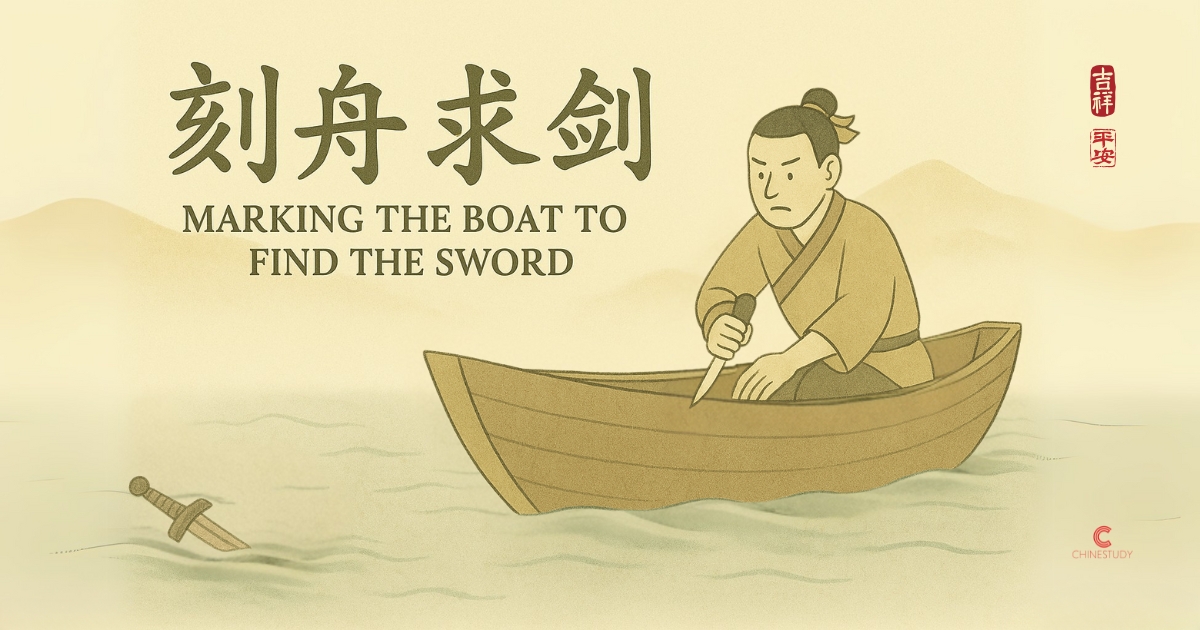🛶 刻舟求剑 kè zhōu qiú jiàn – Marking the Boat to Find the Sword

🔍 What It Means
刻舟求剑 (kè zhōu qiú jiàn) literally means “mark the boat to look for the sword.”
Word-for-word:
- 刻 (kè) – to carve / to mark
- 舟 (zhōu) – boat
- 求 (qiú) – to look for / to seek
- 剑 (jiàn) – sword
It describes someone who sticks to an old method, even when the situation has changed — making their actions useless.
In English, it’s like saying:
- ❌ “Using the wrong method”
- 🕰️ “Not adjusting to reality”
🏺 Where It Comes From
This idiom comes from a story in ancient China:
A man was crossing a river by boat when his sword suddenly fell into the water.
He didn’t panic — instead, he took out a knife and carved a mark on the boat where the sword had dropped.
Later, when the boat stopped, he jumped into the water —
right where he had made the mark.
But of course… the boat had moved.
The sword was long gone.
The lesson?
You can’t solve a problem by holding on to a solution that no longer fits.
💬 How to Use It
Use 刻舟求剑 to describe someone who sticks to old thinking or uses outdated methods, even when the situation has clearly changed.
- ❌ It’s a negative idiom — often used to point out stubborn thinking.
- 🗣 Great for talking about study habits, business decisions, or social mistakes.
🎯 Real Examples
1. 现在的市场变化很快,如果你还用老办法,那就是刻舟求剑。
- Xiànzài de shìchǎng biànhuà hěn kuài, rúguǒ nǐ hái yòng lǎo bànfǎ, nà jiù shì kèzhōuqiújiàn.
- 👉🏼 The market changes fast — if you still use old methods, you’re just marking the boat to find the sword.
2. 他上课不用新教材,坚持用十年前的资料,简直是刻舟求剑。
- Tā shàngkè bú yòng xīn jiàocái, jiānchí yòng shí nián qián de zīliào, jiǎnzhí shì kèzhōuqiújiàn.
- 👉🏼 He refuses to use new teaching materials and sticks to 10-year-old notes — that’s completely outdated thinking.
⚠️ Common Mistakes (Watch Out!)
- ❌ Mistake: Thinking this idiom is about “being patient” or “not giving up.”
- ✅ Correct: It’s about someone doing something that doesn’t make sense anymore because the situation has changed.
💡 Memory Tip

Picture a man carving a mark on the boat to find his sword…
but the boat moves… and the sword stays behind.
That’s 刻舟求剑:
🛶 Don’t solve new problems with old thinking.
✍🏻 Interactive Practice
Translate this sentence into English:
- 情况已经变了,你还按原来的办法做事,不是刻舟求剑吗?
Answer:
Things have changed — if you still use old ways, isn’t that like marking the boat to find the sword?
🌟 Final Thoughts
Things change.
Methods that worked before may not work now.
刻舟求剑 reminds us to stay flexible — to stop, think, and ask:
🧠 “Is this still the right approach?”
👉 Stay tuned for the next idiom in this series!
Thank you for subscribing!
Have a great day!